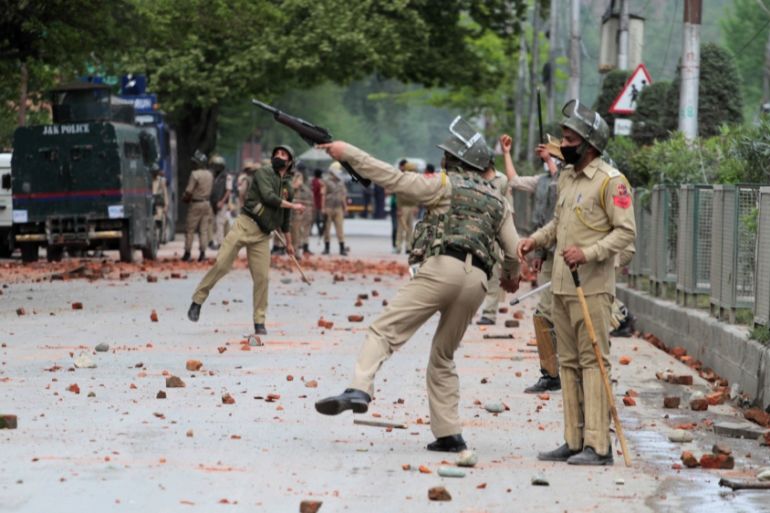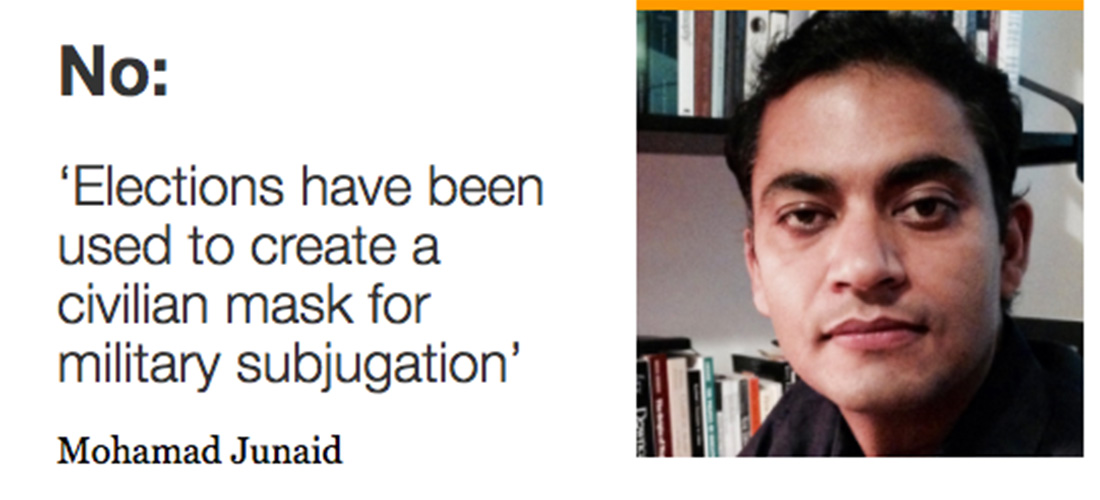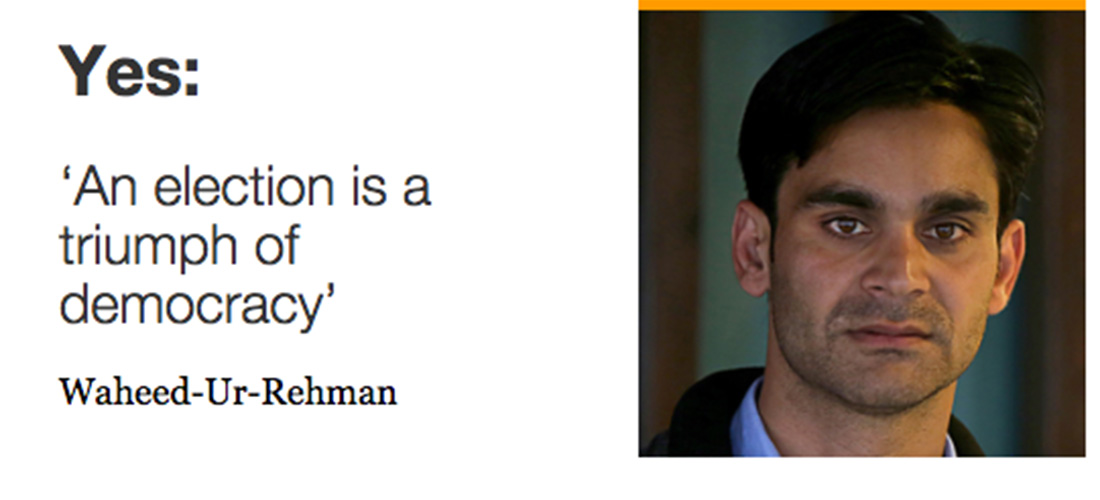Can the Kashmir conflict be resolved at the ballot box?
We asked two Kashmiris with opposing views whether residents of the region should participate in elections.

 |  |
In a recent by-election in Indian-administered Kashmir the turnout was just 7 percent, a historic low. At re-polling only 2 percent turned out to vote. We asked two Kashmiris with opposing views whether residents of the region should participate in elections.
No: ‘Elections have been used to create a civilian mask for military subjugation’
A silence has fallen upon New Delhi in the aftermath of a near total boycott of a by-election in Indian-administered Kashmir.
The Indian government and media were hoping that a large or even moderate turnout for the vote in Srinagar parliamentary constituency – made necessary after a Kashmiri politician resigned from his parliamentary seat in 2016 in protest against violence by the Indian security forces – would help it to once more sweep Kashmir under the carpet.
After all, in Kashmir, unlike anywhere else, it isn’t the result of elections that matter but the turnout. Voter turnout takes on symbolic significance with the Indian government branding even low double-digit turnout a sign that Kashmiris wish to remain under Indian rule, while Tahreek (pro-independence) parties, which do not contest elections as that would require them to first accept Indian sovereignty, see low turnout as part of a continuous referendum on Indian control and a rejection of its institutions. These parties contest the very idea of elections, considering them part of a theatre of the absurd.
But a turnout of just 7 percent – a historic low – was hard to ignore. In re-polling at 38 polling stations, only 2 percent voted. In 27 of the polling stations, nobody turned up to cast their ballot. The government responded by quietly suspending a by-election that was scheduled to be held in the southern constituency of Anantnag two days later.
That eight Kashmiris were killed and more than 100 injured by Indian soldiers on the day of the vote further cemented the violence embedded in the political order that the Indian state has imposed on the people of Kashmir.
‘Nothing to do with democracy’
The very idea of elections under a colonial-style military occupation is ethically compromised, but then ethics are not at play when it comes to Indian rule over a people who remain defiant about their desire for independence.
And elections in Indian-administered Kashmir have nothing to do with democracy.
Since the early 1950s, they have been used to install a pliant leadership that will administer Kashmir on behalf of the Indian state.
Before the mass uprising in the 1990s, Kashmir’s elections had little credibility, a fact admitted by India’s top election officials.
The history of denied candidacies, unopposed victories, and outright rigging has long been an open secret in Kashmir and is well-known among independent observers.
Since 1996, elections have gone hand in hand with the state of emergency. The state of emergency was imposed in 1990 when civil liberties were fully suspended, the military was granted broad immunity, and rogue militias which functioned beyond the purview of the law were created.
Elections have been used as a counterinsurgency tactic, to divide the Tahreek, to create a civilian mask for military subjugation and to present the Indian state as the guarantor of “order” and “democracy” to the outside world.
Holding elections in Kashmir has consequently become a military exercise. Bus-loads of Indian paramilitary forces are brought in to join the tens of thousands who are already in place. The region is put into lockdown mode. Schools and colleges are occupied by the security forces, who fan out to prevent Tahreek activists from conducting boycott campaigns. Tahreek leaders are threatened or arrested. As has become the new norm, a communication blockade is imposed and the internet shut down to prevent any “rumours” of a boycott from spreading.
Then there is the well-honed blueprint for elections in Kashmir, whereby they are held in multiple stages. The first is conducted in an area where military control is tighter, often in the countryside where turnout can more easily be guaranteed. A large turnout there starts a buzz on Indian news channels, where resident experts declare the vote a “success” and announce the death of the separatist forces. During each stage of the election, those districts that aren’t voting are putting under declared or undeclared curfews. In short, every effort is made to ensure that a boycott does not succeed.
In truth, voting has nothing to do with democratic participation in Kashmir. Electoral parties rarely have an agenda and when they do, it barely extends beyond slogans. No one ever knows what a candidate stands for.
Those Kashmiris who vote do so out of old family loyalties and kinship ties, or because of the client-patron relationship that some parties have created in the impoverished countryside, whereby they fear that if they do not vote, their area will be denied basic services, their young men will be arrested or pro-government militias will be sent in to harass them.
It is against all of this that the 7 percent turnout must be understood.
That 93 percent of those who were eligible to vote chose not to do so is clearly a vote: it is a vote against the colonial occupation of Kashmir.
Mohamad Junaid is a doctoral candidate in anthropology at the Graduate Center, City University of New York.
Yes: ‘An election is a triumph of democracy’
An election represents a triumph of democracy, not the defeat of any ideology – despite what much of the Indian media would have you believe. And, let’s be clear, many Indian TV channels, with their blood-boiling rhetoric peddled in place of news, have done more damage to democracy in Indian-administered Kashmir than Pakistan could ever do.
But when a majority of Kashmiris stay away from the polling booths, democracy becomes a joke. Boycotting elections delegitimises democracy.
Years of turmoil have led to a serious social breakdown in Kashmir. People have lost a sense of leadership. Those who have grown up as “children of conflict” see violence as a source of inspiration, the streets as a platform and smart phones as an alternative weapon.
But if there is one thing that has become clear from last summer’s unrest, it is that stone throwers need to be engaged with, whatever the costs. We can’t talk to children through the barrel of a gun. New Delhi must respond to Kashmir politically, rather than through the prism of “security”.
At least 60 percent of Indian-administered Kashmir’s 13 million people are youths. It isn’t always easy for those of us who espouse the idea of mainstream politics to convey our point of view to these young people. But we must.
In the cycles of violence that have plagued this region, it has invariably been the young who have suffered the most; who have made up the majority of the casualties.
Today, it is the young who are keeping others away from the polling booths, who are refusing to allow elections to run smoothly.
Then there are those who issue threats to mainstream political party workers in order to enforce an election boycott.
In few Indian states can a voter claim to have endangered their life by exercising their right to vote. But in Indian-administered Kashmir, every voter is vulnerable. Death threats loom like a sword over those who defy calls for a boycott. The police may be able to guard polling stations, but if a vibrant democratic space is to be nurtured, the safety of every voter must be ensured.
But if peace is to be restored, we must first create a space where all sides can engage on all issues, regardless of their ideology.
Many Kashmiris may see participation in elections as a vote in favour of the Indian state, but if elections in Indian-administered Kashmir are to be seen as a victory for the democratic process, they must not be used to alienate separatists.
Empowering our institutions, nurturing democratic spaces and engaging with contesting narratives is a key to resolving our problems.
And by evoking hatred from the comfort of New Delhi’s news studios, we are only playing into the hands of the separatists. The political aspirations of Kashmiris must surely have a space in a democracy like ours. It is time we learned to respect their sentiments.
Waheed-Ur-Rehman Para is the head of the youth wing of the Jammu and Kashmir People’s Democratic Party. He tweets @parawahid.
The views expressed in this article are the authors’ own and do not necessarily reflect Al Jazeera’s editorial policy.